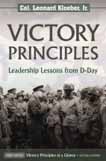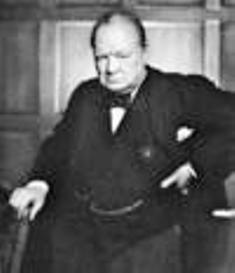Archive for the ‘Winston Churchill’ tag
Winston Churchill, Wartime Leader
Winston Churchill, the Prime Minister of Great Britain during World War II, demonstrated great leadership not only for Britain, but for the Allies overall. He was the right man for the moment, and brought great energy and experience to the job. He demonstrated personal courage, inspired his countrymen, and was decisive when crucial decisions were needed. His legacy still remains as one of the great leaders of the 20th century.
Winston Churchill had an interesting and rich experience well before he became the Prime Minister. He was born into an aristocratic English family in the late 19th century and although he was provided the opportunity to attend fine schools, he was not a good student. Ironically, he also had somewhat of a speech impediment. Both of these shortcomings are now mostly forgotten since he later became a prolific writer and a world renowned orator. Eventually, he matriculated at the Royal Military Academy at Sandhurst and was commissioned as a cavalry officer in the British Army when he graduated in 1984 near the top of his class. After graduation he saw war up close and personal either as a military observer or as a war correspondent in places like Cuba, India, Sudan, and South Africa. He began is political career as an elected Member of Parliament in 1900, and during the First World War he also served briefly as a battalion commander in the rank of lieutenant colonel in France. He also held a series of important political posts in the government that broadened his experience, especially within the defense establishment. In the years after the armistice that ended WWI, his political fortunes waned while he championed various defense initiatives for tanks, aircraft, and ships as a means to offset the growing power of the German Reich. Although these positions were not popular, they catapulted him into power when Germany invaded Poland in 1939. He replaced Prime Minister Chamberlain who had attempted negotiations with Hitler and then lost favor as German aggression continued. Ironically, Churchill became the Prime Minister on May 10th 1940, the same day that the German Army started the blitzkrieg on the Western Front. Now he was able to draw on his decades of experience to lead his nation in a time of war.
After the Germans had overrun the Low Countries and France, it was the British Empire that virtually stood alone against the German war machine. At a time when it would have been easier to seek accommodation with Hitler, Churchill used his great oratory skills and personal courage to muster the strength of British people to prepare for a long and difficult struggle. Despite the losses of the British Army and much of its equipment at Dunkirk, Churchill rallied his nation. He exhorted his countrymen to fight and prevail in the subsequent air battles known as the Battle of Britain even while English cities and towns were bombed by Germans. The Royal Air Force fought valiently even as it sustained terrible losses of fighter aircraft and pilots while fending off the onslaught. His courageous stance as a leader provided a vision and hope that Britain could prevail over the tyranny and aggression of the German Reich.
After the Americans entered the war following the attack on Pearl Harbor, the Prime Minister quickly sought to partner with President Roosevelt to craft a strategy for the way forward. He realistically assessed the situation at the time and correctly evaluated the Allies’ limited capabilities to undertake offensive operations directly against Germany. Although the American military leaders favored an early cross Channel attack, Churchill instead, convinced the President to support a more indirect approach by invading North Africa so that the Allies built up their forces and gained combat experience working together. This was a significant decision that was informed by his deep experience both as a military and political leader. He then tirelessly worked to make sure that the right people were picked for key leadership positions and that they had what they needed to succeed in their mission. Once the Allied forces and leaders had succeeded and gained experience working together, the later then concurred with the Americans to launch the cross Channel attack in 1944.
As with all great leaders, Churchill was a man of vision. He demonstrated personal courage and exercised good judgment on the crucial decisions that were made based on his deep experience from having served in a variety of jobs over the years. His willingness to take risks and use his great oratory skills to communicate and persuade others was instrumental in moving the Allied war effort forward. Without his strong leadership during the war, the history of the second half of the Twentieth Century could have been written quite differently.
For more information follow this link: http://en.wikipedia.org/wiki/Winston_Churchill

